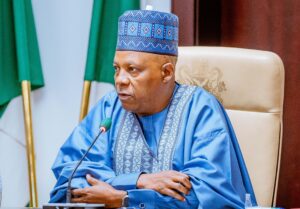FG’s $1.3bn debt to gas producer hampers new investment
The Managing Director of Shell Petroleum Development Company of Nigeria, Osagie Okunbor, has highlighted a significant financial challenge confronting gas producers in the country.
Representing the Oil Producers Trade Section, an association comprising international oil firms, Okunbor revealed that the industry is grappling with outstanding payments totalling $1.3 billion.
This revelation came during a comprehensive stakeholders’ consultative meeting held in Abuja, which saw the participation of a broad spectrum of industry players, including international and local oil entities, major and independent oil marketers, LPG dealers, and regulatory bodies.
Okunbor underscored the detrimental impact of these unpaid debts on the sector, pointing out that such financial hurdles severely limit the capacity for further investments within the gas industry.
The meeting served as a crucial platform for dialogue among the various stakeholders, aimed at addressing pressing financial issues and exploring avenues for fostering a more conducive investment climate in Nigeria’s oil and gas sector.
He said, “At the last count, we are owed about $1.3 billion for gas that has been produced and sold in the past. If you are owed that kind of money across the board, you can imagine the impact. I work for Shell and my colleague here with me works for Chevron, and I think between us we are owed probably the largest share of this.
“So it doesn’t create the environment for you to want to put in more and it is a key issue for the Decade of Gas discussions that we are having. How do we crack this problem so that you incentivize people to make investments?
“How do we build the infrastructure? You heard the minister talk about key infrastructural projects that are under construction such as the AKK (Ajaokuta-Kaduna-Kano pipeline project) and others.”
Okunbor also said that gas pricing must be bankable, stressing that the cost should not be high but should be sufficient to drive investments in the sector.
He said, “They’ve just released the price (for gas). I don’t want to cause any controversy, but it is due for review in April.
“So, we will be making our inputs to the authority to make sure the price is cost-reflective. It is very important because if it is not cost-reflective it is going to involve a whole lot of things.”
The Minister of State for Petroleum Resources (Gas), Ekperikpe Ekpo, said that in a strategic move to bolster the domestic gas sector and alleviate the financial burden on consumers, the Federal Government has initiated a series of interventions to substantially lower the price of Liquefied Petroleum Gas (LPG), commonly called cooking gas.
At the stakeholder meeting, the minister also talked about the government’s commitment to sustainable development within the gas sector.
Ekpo outlined the administration’s focus on three key areas designed to drive growth and efficiency.
Among these critical initiatives, a significant emphasis is being placed on measures that would lead to a notable reduction in the cost of cooking gas, addressing one of the significant concerns of Nigerian households and businesses reliant on LPG for their daily needs.
This approach underscores the Federal Government’s dedication to enhancing the energy sector’s contribution to the national economy and improving the affordability of cooking gas for the broader population.
He said, “We will intensify efforts to increase upstream gas production, to bridge the significant gas supply gaps which continue to hamper our strategic economic sectors (gas to power and gas-based industries, as well as gas for export).
“It is imperative that we work together to unlock more resources to provide gas for power, gas-based industries, LNG export, and domestic use, fostering economic growth, ensuring energy security, and eradicating poverty, which is a cardinal objective of President Bola Tinubu’s Renewed Hope Agenda.
“We will prioritise the domestication and penetration of LPG and implement measures to significantly reduce the price of cooking gas for our people, ensuring it becomes more accessible, available, and affordable for our citizens.”




